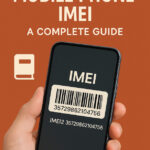Many people search for ways to change their phone’s IMEI number, but very few realize the legal implications.
An IMEI (International Mobile Equipment Identity) is a 15-digit code that uniquely identifies every mobile device. While it plays a vital role in connecting your phone to networks, tampering with or altering the IMEI is strictly regulated.
In many countries, including the United States, changing an IMEI without authorization is considered illegal and may lead to penalties.
Some exceptions exist when official service centers repair or replace faulty devices, but personal attempts to change IMEI numbers can bring legal trouble. Understanding these laws is just as important as knowing the technical steps.
What Exactly is an IMEI Number?
An IMEI number (International Mobile Equipment Identity) is a 15-digit code given to every phone during manufacturing. Think of it as your phone’s fingerprint. It helps carriers identify your device and block stolen phones from working on networks.
- The IMEI has three parts: device type, serial number, and a check digit.
- Networks use it to confirm whether a device is valid or blacklisted.
- Without IMEI, your phone cannot register on mobile networks.
Free Secret eBook
Android IMEI Handbook
Learn safe IMEI tricks and Android settings in one place. Simplify your Android settings with expert tips.
DOWNLOAD
Is Changing IMEI Illegal In the USA?
Changing an IMEI is not just a technical process and it carries legal risks. In the USA, the Federal Communications Commission (FCC) prohibits tampering with IMEI numbers.
Fraud concerns: Altering IMEI is seen as fraud because it can hide stolen devices.
Punishment: Violators can face fines and penalties.
Security risk: Carriers and law enforcement monitor IMEIs to track phones.
Exceptions: Only authorized service centers or manufacturers can legally fix corrupted IMEIs.
The government has taken this important step to stop the incidents of mobile theft. The move will make tracking lost handsets easier and will also help limit issues related to fake IMEI numbers. It is completely illegal, if anyone intentionally changes, deletes, alters, or destroys the IMEI number.
A new rule called “Prevention of tampering of Mobile Device Equipment Identification Number” indicates that any person has been found guilty if he has intentionally tampered with or altered the unique number.
This new rule has made it easier for the police and any other security agency to track the mobile phone when a thief or someone changes the IMEI number.
🛑 Disadvantages of Changing IMEI Number:
There are some major disadvantages of changing the IMEI number on the Android Device:
◘ Changing the IMEI number has a major impact on the warranty period. Changing the IMEI will invalidate the warranty. This way you never claim a warranty from your device manufacturers.
◘ Changing IMEI is a daunting task, if something goes wrong, you just destroyed your smartphone. In worse cases, the virus will take effect.
◘ In addition, if you don’t perform the procedure properly, your new unique number doesn’t work. Moreover, your handset won’t be able to access GSM.
◘ As mentioned, it is illegal in many countries, which can put you in legal trouble if changed intentionally to harm someone or unlawfully. It is a punishable offense, so you need to be even more careful when it comes to changing the IMEI number.
◘ IMEI is the identification number of a particular device. If you don’t own a specific tool and get caught red-handed, you will be in trouble.
Is changing the IMEI number of a phone illegal in the United States?
While some online sources may claim IMEI modification is outright illegal, the reality under U.S. law is more subtle. There is no federal law explicitly prohibiting changing an IMEI number. In fact, a proposed bill in 2012 to criminalize IMEI tampering never passed.
However, a closer look reveals a broader legal context. The Wireless Telephone Protection Act of 1998 makes it a federal crime to knowingly use or possess equipment intended to alter telecommunication identifiers, including IMEIs, without authorization.
Despite this, enforcement appears limited, and some tech discussions reflect this ambiguity. For example, a Reddit user noted that while it may be legal, “nothing good can come of it,” pointing to possible unintended consequences.
Frequently Asked Questions:
Changing an iPhone’s IMEI is practically impossible for the average user because Apple designs its hardware and software with strict security controls. Any attempt requires advanced tools and unauthorized modifications, which can damage the phone permanently. Legally, altering an iPhone IMEI is treated as fraud in most countries, including the U.S. Even if someone managed to do it, the phone would likely lose network support, and law enforcement could detect it. In short, both technically and legally, it’s not worth the risk.
Yes, changing or tampering with an IMEI will void the phone’s warranty. Manufacturers like Apple, Samsung, and others consider IMEI modification an unauthorized act that compromises the device’s identity. Once detected, they refuse warranty repairs, replacements, or official support.
No, changing only the IMEI won’t fully hide your phone. Mobile networks identify devices using multiple data points, such as IMSI numbers, SIM information, and hardware fingerprints. Even if the IMEI is altered, carriers and law enforcement have systems to cross-check identifiers.



I had the exact same problem when I imported a OnePlus model that wasn’t on AT&T’s whitelist. Even though it supported the same LTE bands, the carrier still blocked it after detecting the IMEI mismatch. I looked into reusing an IMEI from another phone I owned, but everything I read suggested that in the U.S., doing so could fall under fraud laws. In the end, I just switched to T-Mobile, which was more accepting of international models.
Hi Alex, that’s the safest route. While not always explicitly illegal, reusing or cloning an IMEI from another device can be treated as misrepresentation. Carriers track IMEIs carefully, and switching to a more flexible provider avoids legal and technical headaches.